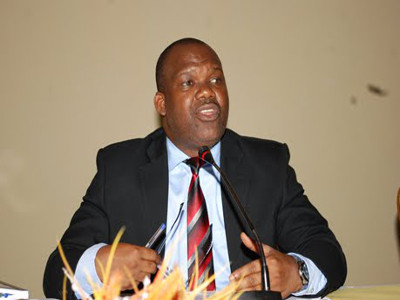"Without a voting machine, there will be no elections on December 23, 2018,” Mr. Corneille Nangaa told the AFP, when questioned on the position of the United States which has said it is opposed to the use of a system of electronic voting in the upcoming elections.
"The elections of December 23, 2018 will be done with the voting machines," he said by phone from New York.
On Monday, the United States declared its opposition to an electronic voting system for the triple elections on December 23, as seven members of the Security Council urged President Kabila to announce that he would not be a presidential candidate. "We are deeply concerned by the election commission’s insistence on using an electronic voting system that has never been used in the DRC” for the December presidential, legislative and provincial polls, US ambassador to the United Nations Nikki Haley said.
“These elections must be held by paper ballots so there is no question by the Congolese people about the results. The U.S. has no appetite to support an electronic voting system”, Mrs. Haley added.
If we must use paper bulletins, elections would be held in July 2019, Nangaa said. "The elections in the DRC are not a matter of the United States or the Security Council. The INEC wants to make sure its independence is respected" vis-à-vis its domestic and foreign partners.
"It is not enough to say that the voting machines are bad, one must also propose a solution instead, especially how much they are willing put on the table!", said the spokesman of the Congolese government, Lambert Mende.
The cost of voting is estimated at $ 432 million with voting machines and $ 554 million for paper ballots.
It is up to the INEC to “make the decision that suits it. No one has the right to give injunctions to the INEC,” Mr. Mende added.
The DRC is undermined by a crisis aggravated by the continuation in power of President Kabila, whose second term ended on December 20, 2016.
Kinshasa justified the non-holding of elections at the end of 2016 by security problems. Elections had been scheduled for the end of December 2017, before being postponed until 23 December 2018.
The climate is very tense, the opposition has rejected the use of the voting machines and accuses Mr. Kabila of trying to do everything to stay in power.
"We do not want the voting machines," said Vital Kamerhe, leader of the third opposition political force in the National Assembly. "With these machines, there will be no voting booth." When voters choose their candidates on these voting machines, everything will be under the pressure of the military, police and intelligence officers who will be there during this process."
Related articles
- • DRC and Rwanda Sign Declaration of Principles for Peace in Eastern Congo (April 25, 2025)
- • European Union Suspends Defence Consultations with Rwanda (February 24, 2025)
- • UN Security Council Calls on Rwanda to Stop Supporting M23 Rebels in DR Congo (February 22, 2025)
- • US Sanctions Rwanda's Minister James Kabarebe for Central Role in DR Congo Conflict (February 20, 2025)
- • Rwanda-Backed M23 Rebels Summarily Executed Children in Bukavu, UN Reports (February 19, 2025)
- • DR Congo Citizens Head to Polls to Elect President, Members of Parliament (December 20, 2023)
- • Felix Tshisekedi Sworn In as DR Congo President (January 24, 2019)
- • Constitutional Court Declares Tshisekedi Winner of Presidential Election (January 19, 2019)
- • Martin Fayulu Challenges Presidential Election Results in Court (January 12, 2019)
- • Felix Tshisekedi Vows to Be the President of All Congolese (January 10, 2019)
- • Martin Fayulu Rejects Presidential Election Results (January 10, 2019)
- • Felix Tshisekedi Elected DR Congo President (January 10, 2019)
- • DR Congo Delays Results of December Election (January 6, 2019)
- • Bemba, Katumbi renew their support for joint opposition presidential candidate Fayulu (November 16, 2018)
- • Vital Kamerhe also withdraws support for joint opposition presidential bid (November 12, 2018)
- • Felix Tshisekedi withdraws support for joint opposition presidential bid (November 12, 2018)
- • Oppositioin leaders pick Martin Fayulu as joint presidential candidate (November 11, 2018)
- • Jean-Pierre Bemba banned from running for president (August 25, 2018)
- • Vital Kamerhe named UNC presidential candidate (August 4, 2018)
- • Bemba says Katumbi should be allowed to run for president (August 4, 2018)
- • Moise Katumbi blocked from entering DR Congo (August 3, 2018)
- • Jean-Pierre Bemba Returns to DR Congo (August 1, 2018)
- • Jean-Pierre Bemba named MLC presidential candidate (July 13, 2018)
- • At least 30 dead after massacres in Ituri (March 2, 2018)
- • Botswana Urges Joseph Kabila to Step Down (February 26, 2018)
- • US Warns DR Congo Against Electronic Voting for Delayed Election (February 12, 2018)
- • Presidential election scheduled for December 23, 2018 (November 5, 2017)
- • Felix Tshisekedi accuses INEC of illegally prolonging Kabila's mandate (October 24, 2017)
- • DRC Seeks Arrest of Presidential Candidate Moise Katumbi (May 19, 2016)
- • Papa Wemba Is Buried in Kinshasa (May 4, 2016)








